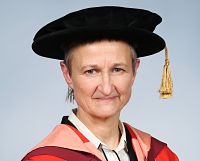Professor Ineke Sluiter FBA

Doctor of Letters
Tuesday 18 February 2020 - Orator: Professor Karla Pollmann
Listen to the full oration and honorary speech on Soundcloud
Deputy Vice-Chancellor,
It is a great pleasure for me to give the oration for Professor Ineke Sluiter on the occasion of her award of an honorary degree of Doctor of letters at the University of Bristol.
Ineke Sluiter has been known to me both through her writings and in person for almost two decades. She studied Greek and Latin Language and Culture at VU University Amsterdam, and then worked at various prestigious American universities (including the University of Pennsylvania). She then returned to the Netherlands where she has been Professor of Greek Language and Literature at Leiden University for 22 years. She is the most renowned and visible Classicist in the Netherlands with an impressive international reputation. This is evidenced by an outstanding and sustained track record of academic honours in the Netherlands and beyond. In 2010 Ineke received the Spinoza Prize, the most prestigious scientific award of the Netherlands, sometimes referred to as the Dutch Nobel Prize. In 2016 she won the KNAW Academy Professor prize intended for researchers whose lifetime achievements show them to be world-class in their field. Since 2012 she has been a member of the Royal Netherlands Academy of Arts and Sciences, and she is its President elect for 2020 to 2022. In 2017, she was elected a corresponding fellow of the British Academy.
Ineke Sluiter is arguably the most innovative and original Classicist in the world, with a strong facility for making the discipline relevant for big societal questions. Few other scholars are as effective at connecting the concerns and interests of the ancient world to those of the present day. She does not regard language studies as a sealed-off world, but rather as a window to universal issues, for example freedom of speech, education, and cultural identity. She publishes and presents her research in a broad range of disciplines, from history to philosophy and cognitive science, attesting to her ability to interpret the details of ancient grammar and rhetoric within a much broader conceptual context. This is most strikingly evident from her academic leadership as director of a new research agenda for Dutch classicists entitled “Anchoring Innovation”. This explores how the ancient Greeks and Romans combined radical social innovation with a deep predilection for the past, as expressed in their use of language and in their literature. This project is funded by a Gravitation Grant of 18.8 million euros to develop this research agenda over a period of ten years (2018-2027). The grant is normally awarded to the sciences, medicine, and technology, so this will be the first group of Humanities scholars to take on this challenge. The project probes the ‘human factor’ in technological innovation from a unique perspective – namely language – and explores whether societies accommodate or embrace innovation. Successful innovations must somehow be ‘anchored’ for the relevant social groups, and the project’s hypothesis is that this is done by connecting tradition to innovation in order that the former (as an ‘anchor’) makes the latter acceptable for a society. The project explores the new concept of ‘anchoring’, and some of the ways in which ‘the new’ and ‘the old’ are evaluated and used in classical antiquity and our own times. Its examples range from a piece of ancient theatrical equipment to the history of the revolving door, from an ornamental feature of Greek temples to the design of electric cars, and from the Delphic oracle to the role of the US Constitution. It is this bold, innovative and interdisciplinary scope that makes Ineke a highly attractive partner for the University of Bristol. In particular the Institute for Greece, Rome and the Classical Tradition shares Ineke’s passion for linking ancient issues to the modern world. There are also overlaps in her interests with the Brigstow Institute and the Jean Golding Institute.
Beyond doing research into communication, Ineke is also an excellent communicator herself. She regularly gives lectures about ancient topics that are open to the wider public – I myself attended some of these and witnessed their great popularity. She also is keen on supporting students, in particular the next generation of scholars. For instance, she supervises a group of enthusiastic students, called “Homer’s Angels”, who decipher and digitize ancient manuscripts containing texts and short marginal commentaries on Homer’s Iliad and Odyssey. Ineke also has a keen interest in supporting female scholars in overcoming women-specific challenges in academe, and has for this purpose co-founded a group called “Athena’s Angels”. Again there is here a natural convergence with core priorities of the University of Bristol.
Deputy Vice-Chancellor, I present to you Ineke Sluiter as eminently worthy of the degree of Doctor of Letters honoris causa.